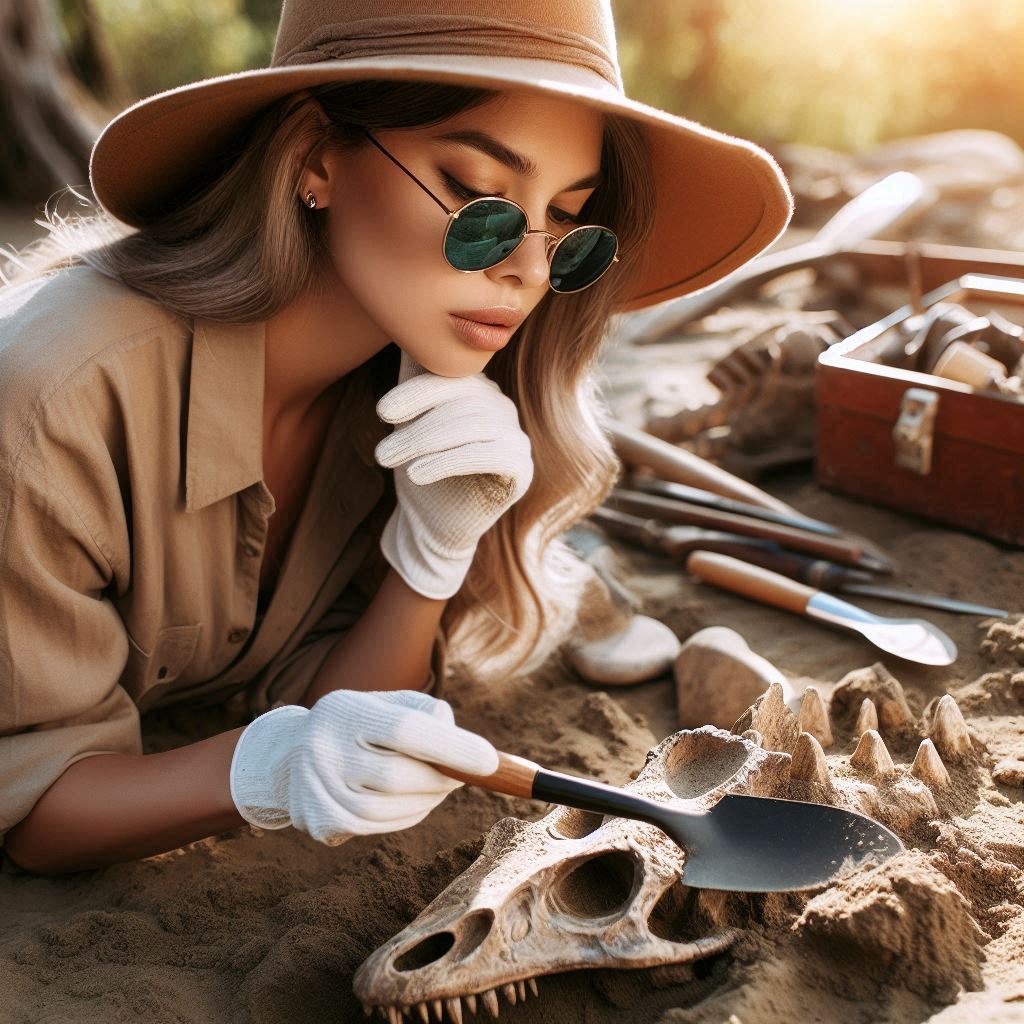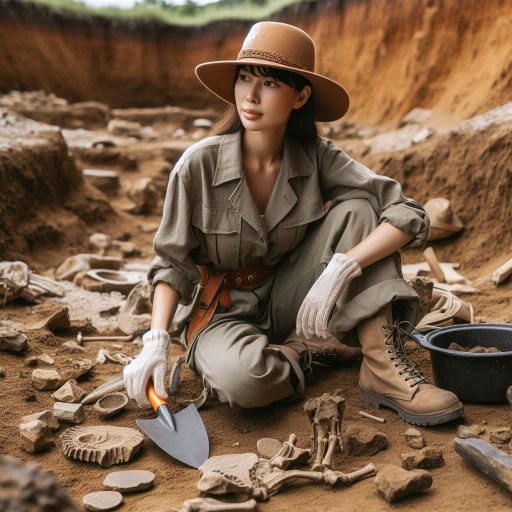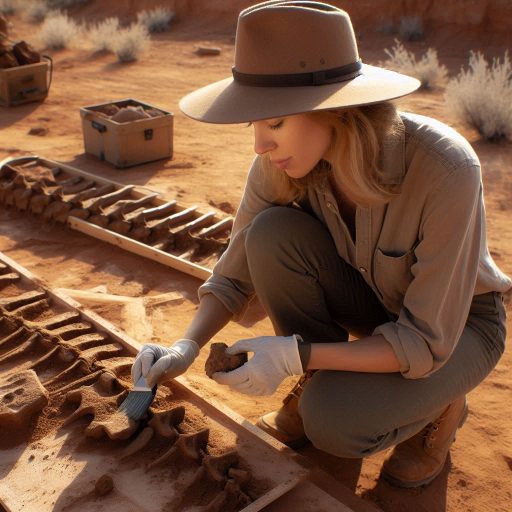Introduction
Archaeology is the scientific study of human history and prehistory through the excavation and analysis of artifacts, structures, and other physical remains.
It seeks to uncover the stories of past civilizations, their cultures, and the ways they interacted with their environments.
Archaeologists play a crucial role in studying and preserving history.
Their work helps us understand our collective past and informs our present and future.
By examining ancient artifacts and sites, archaeologists uncover insights into human behavior, social structures, and technological advancements.
To become a successful archaeologist, certain skills and qualities are essential.
Strong analytical abilities enable archaeologists to interpret complex data and draw meaningful conclusions.
Excellent communication skills are vital for sharing findings with the public and collaborating with diverse teams.
Attention to detail ensures that no significant evidence is overlooked during research and excavation.
Additionally, physical stamina is necessary for fieldwork, which often involves strenuous activities in various environments.
A passion for history and a curiosity about the past drive successful archaeologists to uncover and protect our cultural heritage.
Step 1: Earn a Bachelor’s Degree
To become an archaeologist, you must first earn a bachelor’s degree.
This step is crucial for building a strong foundation in the field.
Research and Choose a Reputable University That Offers a Degree in Archaeology or Related Fields
Begin your journey by researching universities that offer reputable archaeology programs.
Look for institutions with strong faculty and research opportunities.
Consider universities known for their anthropology or history departments.
These fields often provide essential coursework for aspiring archaeologists.
Once you identify potential universities, evaluate their degree offerings.
Check if they provide a dedicated archaeology program or a related field.
Review the curriculum to ensure it includes foundational courses in anthropology and history.
A well-rounded education will serve you well in your future career.
Next, apply to the universities that align with your goals.
Gather the necessary application materials, including transcripts and recommendation letters.
Prepare for any entrance exams if required.
Submit your applications before the deadlines to maximize your chances of acceptance.
Take Courses in Anthropology, History, Archaeology, and Other Relevant Subjects to Build a Strong Foundation
Upon acceptance, immerse yourself in your studies.
Focus on building a solid foundation in relevant subjects.
Take courses in anthropology, history, and archaeology to gain a comprehensive understanding of the field.
These subjects will introduce you to key concepts and methodologies in archaeology.
In your archaeology courses, engage with the material actively.
Participate in discussions and ask questions to deepen your understanding.
Seek opportunities for hands-on experiences through fieldwork or lab assignments.
These experiences will help you apply theoretical knowledge to real-world situations.
Additionally, explore related subjects that can enhance your skill set.
Consider courses in geology, environmental science, or cultural studies.
Understanding these disciplines can provide valuable insights into archaeological contexts.
They can also broaden your perspective on human history and cultural development.
Make use of university resources to further your education.
Visit your school‘s career center for guidance on internships and volunteer opportunities.
Many universities have archaeological field schools or partnerships with museums.
Participate in these programs to gain practical experience and network with professionals in the field.
Stay organized throughout your academic journey.
Keep track of important deadlines for assignments, exams, and internship applications.
Balance your coursework with extracurricular activities that showcase your passion for archaeology.
Join clubs or organizations related to history or archaeology to connect with like-minded peers.
As you progress in your degree, consider your future specialization.
Think about the areas of archaeology that interest you the most.
These could include prehistoric archaeology, historical archaeology, or underwater archaeology.
Identifying your focus will guide your future academic and career decisions.
Completing your bachelor’s degree in archaeology or a related field is a significant milestone.
It lays the groundwork for your future studies and career.
Once you earn your degree, you can move on to further education or entry-level positions in archaeology.
Embrace this first step as an exciting beginning to your archaeological journey.
Read: Preparing for a Botany PhD: Tips and Advice
Step 2: Gain Field Experience
After earning your bachelor’s degree, the next step in becoming an archaeologist is to gain field experience.
Practical skills are essential for a successful career in archaeology.
Engaging in hands-on experiences will prepare you for future opportunities.
Look for Internship Opportunities at Archaeological Sites or Museums to Gain Hands-On Experience
Start by searching for internship opportunities at archaeological sites or museums.
Many organizations offer internships that provide valuable experience in the field.
Internships allow you to work closely with professionals and learn about archaeological practices.
Visit university career centers to find internship listings.
These centers often have connections with archaeological organizations.
Attend career fairs to meet potential employers and learn about available positions.
Networking with faculty and professionals in the field can also lead to internship opportunities.
When applying for internships, tailor your resume and cover letter.
Highlight your relevant coursework and any previous experience.
Emphasize your enthusiasm for archaeology and your desire to learn.
A well-crafted application will increase your chances of being selected for an internship.
During your internship, take the initiative to engage fully.
Observe the work being done and ask questions to deepen your understanding.
Seek opportunities to participate in various tasks, from excavation to artifact analysis.
This hands-on experience will enhance your skills and knowledge of archaeological methods.
Volunteer for Archaeological Fieldwork Projects to Learn Practical Skills and Techniques
In addition to internships, consider volunteering for archaeological fieldwork projects.
Many organizations rely on volunteers to assist with excavations and research.
Volunteering is a great way to gain practical experience while contributing to meaningful projects.
Look for local archaeological societies or community organizations that offer volunteer opportunities.
These groups often have ongoing projects that welcome volunteers.
Participate in field schools or excavation sites to learn from experienced archaeologists.
When volunteering, be prepared for physically demanding work.
Excavation can be challenging, but it provides invaluable learning experiences.
You will learn essential techniques, such as digging, surveying, and recording findings.
Working in a team setting also helps develop your collaboration skills.
Take advantage of networking opportunities while volunteering.
Connect with fellow volunteers and professionals in the field.
These connections can lead to future job opportunities or recommendations for graduate programs.
Stay open to various experiences during your volunteer work.
Each project will teach you something new and expand your skill set.
Whether it‘s analyzing artifacts or assisting in site documentation, every task is valuable.
By gaining field experience through internships and volunteering, you will build a strong foundation for your archaeological career.
These experiences will enhance your resume and provide you with practical skills.
Once you have sufficient field experience, you can confidently pursue advanced studies or professional positions in archaeology.
Embrace this step as an essential part of your journey to becoming an archaeologist.
Read: Exploring the Different Branches of Geology
Step 3: Pursue a Graduate Degree
After gaining valuable field experience, the next step in becoming an archaeologist is to pursue a graduate degree.
An advanced degree allows you to specialize in a specific area of interest and deepen your knowledge in archaeology.
Consider Obtaining a Master’s or Ph.D. in Archaeology to Specialize in a Specific Area of Interest
Begin by considering whether a master’s or Ph.D. in archaeology is right for you.
A master’s degree typically takes two years to complete and allows for specialization in areas such as prehistoric archaeology, historical archaeology, or bioarchaeology.
This degree can enhance your career prospects and may be required for certain positions.
If you aspire to teach at the university level or conduct high-level research, consider pursuing a Ph.D.
This advanced degree usually takes four to six years and involves original research.
A Ph.D. will equip you with the expertise to contribute significantly to the field of archaeology.
Reflect on your career goals when deciding which degree to pursue.
Consider the type of work you want to do and the qualifications needed for that role.
A graduate degree will not only expand your knowledge but also open doors to various career paths.
Research Graduate Programs That Align with Your Career Goals and Academic Interests
Once you’ve decided to pursue an advanced degree, research graduate programs that fit your career goals and academic interests.
Start by identifying universities with strong archaeology programs.
Look for faculty members whose research aligns with your interests.
A supportive advisor can significantly enhance your academic experience.
Examine the curriculum of each program you consider.
Ensure that the courses offered align with your specific area of interest.
Programs that offer fieldwork opportunities, lab work, or research projects can provide valuable hands-on experience.
Consider the location of the graduate programs as well.
Proximity to archaeological sites or research institutions can enhance your educational experience.
Being near relevant resources will allow you to engage with the local archaeological community.
Reach out to current students or alumni of the programs you are considering.
They can provide insights into the program’s strengths and weaknesses.
Their experiences may help you make an informed decision about where to apply.
Pay attention to application requirements for each program.
Gather transcripts, letters of recommendation, and a well-crafted personal statement.
Your personal statement should highlight your academic background, field experience, and research interests.
A compelling narrative can set your application apart.
Once accepted into a graduate program, focus on maximizing your educational experience.
Engage with faculty, participate in research projects, and attend seminars.
Take advantage of any fieldwork opportunities that arise.
This hands-on experience will further prepare you for your future career.
By pursuing a graduate degree in archaeology, you will deepen your knowledge and refine your specialization.
This step is crucial for advancing your career and achieving your goals in the field.
Embrace the opportunities that come with graduate studies and take your archaeological journey to the next level.
Read: Interdisciplinary Research: Botany and Other Sciences

Step 4: Build a Network
Building a professional network is crucial for advancing your career as an archaeologist.
A strong network can provide support, resources, and valuable connections within the field.
Attend Archaeological Conferences, Workshops, and Seminars to Connect with Professionals in the Field
Start by attending archaeological conferences, workshops, and seminars.
These events are excellent opportunities to meet professionals, researchers, and fellow students.
Networking at these events can lead to mentorship opportunities and collaborations in your future projects.
Before attending, research the conferences relevant to your interests.
Many conferences feature keynote speakers, panel discussions, and poster presentations.
Engage with speakers and attendees during Q&A sessions to foster connections.
Participate in workshops and hands-on sessions.
These opportunities will allow you to learn new techniques while meeting industry leaders.
Engaging with others during these events will help you establish a presence in the archaeological community.
After the events, follow up with the contacts you made.
Send a quick email to express your appreciation for their insights.
This gesture keeps you on their radar and opens the door for future communication.
Join Professional Organizations Like the Society for American Archaeology to Stay Updated on Industry Trends and Job Opportunities
Joining professional organizations is another effective way to build your network.
Consider organizations like the Society for American Archaeology (SAA) or the Archaeological Institute of America (AIA).
Membership in these organizations often provides access to resources, job listings, and industry updates.
These organizations host events, webinars, and workshops that are valuable for networking.
Participate actively in these gatherings to connect with other members.
Engage in discussions and share your research or field experiences to establish your expertise.
Many professional organizations also publish journals and newsletters.
Subscribing to these publications will keep you informed about the latest research and developments in archaeology.
They often feature job postings, grants, and funding opportunities as well.
Use online platforms and social media to connect with other professionals.
LinkedIn is a great resource for networking within the archaeology community.
Join relevant groups and participate in discussions to expand your reach.
Attend local chapter meetings of professional organizations to connect with individuals in your area.
These meetings provide a more intimate setting for networking and collaboration.
Establishing local connections can lead to opportunities for volunteer work, internships, or job offers.
As you build your network, remember to be genuine and supportive.
Offer assistance or share your resources with others in your network.
Building meaningful relationships takes time, but these connections will benefit your career in the long run.
Building a professional network is a vital step in your archaeological career.
Attend conferences, join professional organizations, and engage with your peers.
These efforts will help you stay informed, gain opportunities, and establish a strong presence in the field of archaeology.
Embrace networking as an essential part of your journey toward becoming a successful archaeologist.
Read: Women in Botany: Celebrating Pioneers and Leaders
Step 5: Secure Employment
After completing your education and gaining experience in the field, it‘s time to secure employment as an archaeologist.
This step involves applying for positions and effectively showcasing your qualifications to potential employers.
Apply for Entry-Level Positions at Museums, Universities, Government Agencies, or Cultural Resource Management Firms
Begin your job search by applying for entry-level positions in various settings.
Museums, universities, government agencies, and cultural resource management (CRM) firms often seek recent graduates.
These positions can provide valuable experience and help you establish your career.
Research potential employers to identify job openings that match your skills and interests.
Many institutions advertise positions on their websites or through job boards.
Regularly check sites like Indeed, LinkedIn, and specialized archaeology job boards for the latest listings.
When applying, carefully read the job descriptions and tailor your applications to each position.
Highlight your relevant experience and skills in your cover letter.
Be sure to explain why you are a good fit for the role and the organization.
Networking can also play a significant role in your job search.
Reach out to contacts you‘ve made in the field for potential job leads.
Informational interviews can help you gain insights into various organizations and their hiring processes.
This proactive approach may lead to job opportunities that are not widely advertised.
Consider internships or temporary positions if you face challenges finding full-time employment.
These opportunities can lead to permanent positions and further enhance your experience.
Develop a Resume and Portfolio Showcasing Your Education, Fieldwork Experience, and Research Projects
Creating a strong resume is essential for securing employment in archaeology.
Your resume should highlight your education, fieldwork experience, and relevant skills.
Include your degree, internships, volunteer work, and any field projects you have participated in.
Make sure to use action verbs to describe your experiences.
Phrases like “conducted excavations,” “analyzed artifacts,” or “collaborated with a team” convey your active role in projects.
Keep your resume concise and focused, ideally no longer than one page.
In addition to your resume, develop a portfolio showcasing your work.
Include samples of research projects, reports, and any presentations you have delivered.
Photographs from fieldwork, excavation sites, and artifacts can provide visual evidence of your experience.
If you have published any articles or papers, include them in your portfolio.
These documents demonstrate your ability to contribute to the field academically.
A well-organized portfolio reflects your professionalism and commitment to archaeology.
Prepare for interviews by practicing common questions asked in archaeology positions.
Be ready to discuss your experiences and how they relate to the job you are applying for.
Showcase your passion for archaeology and your willingness to learn and grow within the role.
Once you secure a job offer, carefully review the terms and conditions before accepting.
Consider factors such as salary, benefits, work environment, and opportunities for advancement.
This step is crucial for ensuring that your new position aligns with your career goals.
Securing employment in archaeology marks a significant milestone in your career journey.
By applying for entry-level positions and presenting a strong resume and portfolio, you will enhance your chances of success.
Embrace this opportunity to contribute to the field of archaeology and continue your professional growth.
Transform Your Career Today
Unlock a personalized career strategy that drives real results. Get tailored advice and a roadmap designed just for you.
Start NowSee Related Content: Soil Science in Space: Martian Soil Studies
Conclusion
Becoming an archaeologist involves several key steps that require dedication and passion.
First, pursue a relevant degree in archaeology, anthropology, or a related field.
This foundational education provides essential knowledge and skills.
Next, gain practical field experience through internships, field schools, or volunteer opportunities.
Hands-on experience is crucial for developing practical skills and understanding real-world challenges.
As you progress, focus on developing essential skills in research, analysis, and critical thinking.
These abilities will be invaluable throughout your career.
Networking with professionals in the field is also important; building connections can lead to job opportunities and collaborations.
Consider obtaining a master‘s or Ph.D. for advanced career options and specializations, such as underwater archaeology or cultural resource management.
Each step requires hard work and commitment, but the rewards are immense.
Archaeology allows you to uncover and preserve our rich cultural heritage.
By pursuing your passion, you contribute to a greater understanding of humanity’s history.
Embrace the journey and stay curious, as every discovery deepens your connection to the past.
Your work can inspire future generations to appreciate and protect our shared heritage.
Follow your passion, and you can make a meaningful impact in the field of archaeology, helping to preserve our cultural treasures for years to come.




